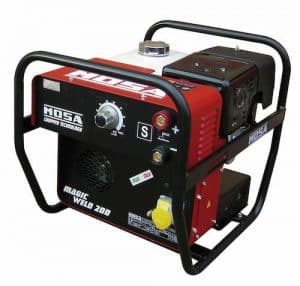The Best Portable Generators For Welding
Choosing the right generator for your welding practices may seem complicated.
Even more so, if you’re not sure what to look for when buying a generator.
There is a lot of information about the subject online. But with all the technical terms and variables it’s easy to get lost.
Here you can easily determine which generator to buy for your welding works.
So unnecessary technical details aside, let’s dive straight into:
How to choose your welding generator
Because you are looking for a generator we assume that you already have a welding machine.
If you don’t currently have one here is what you need to know when choosing a beginner welder.
Now, you’ll need to determine the type of your welder and how many amps your welder has.
These you can normally find on your welder (in the information label). Otherwise search for these details online or with your welder’s manufacturer.
Once you know if your welder is a DC Inverter or an AC Transformer/Traditional welder, and the amp of your welder; continue to read below about the one that matches your welder’s type.
If you use a DC inverter welder
Below is a table that indicates how many watts your generator should have, based on the amp of your welder.
| Inverter Welder Output |
Suggested “Minimum” Size of Generator |
| Up to 160Amp | 3.6-4kw |
| 180–225Amp | 5.5-6kw |
| 250Amp | 6-7kw |
*Please note these figures are only to provide an indication and you should always follow the manufacturer’s recommendations.
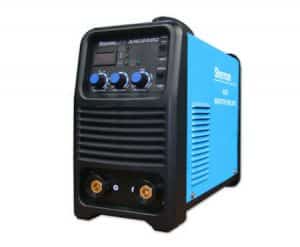
It’s important to note that Inverter welders should always be used with quality input power.
That’s why you must get a good generator that allows you an uninterrupted power supply for a smooth, ongoing welding process.
Working with a low-quality generator can cause fluctuations or spikes and surges. This could damage your welding machine and interfere with the welding process.
When it comes to a generator for your inverter welder, one of the ways to ensure the quality of the electricity coming out of your generator is to know the Generator’s THD.
Total Harmonic Distortion (THD) purpose is to measure the quality of electricity. When choosing your generator aim for one with lower than 6% THD for “clean” electricity. With THD higher than 6%, the life of the electrical circuits may be reduced, which can cause the machinery to operate incorrectly.
High THD often means a low-quality generator that should never be used to run inverter welders.
One way to know the THD of a generator is to measure it with a good THD meter. Since this is however a costly device and the test can only be done after you buy your generator, you’d better check for that information with the welder’s manufacturer (can sometimes be found online too).
If your welder is an AC transformer
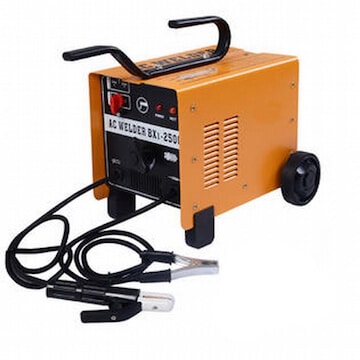
Below is a table that indicates how many watts your generator should have, based on the amp of your welder.
| Inverter Welder Output |
Suggested “Minimum” Size of Generator |
| Up to 160Amp | 3.6-4kw |
| 180–225Amp | 5.5-6kw |
| 250Amp | 6-7kw |
AC transformers tend to be more reliable and less vulnerable to dirty power than DC Inverter welders. Therefore, traditional welders should work fine with any generator.
The best generator for welding
Looking for a good generator to run a single welding machine of upto 250amp?
Below is a great for 120V and small 240V DC and AC welders.
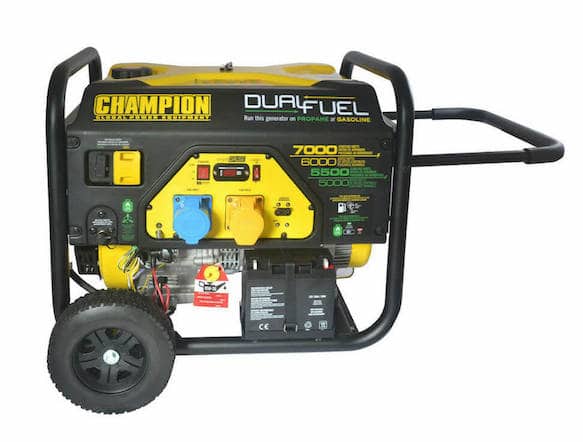
Champion 7000 Watt Generator
Why go for the Champion 7000 Watt Dual Fuel Generator
- Simple to operate.
- Reputable brand name.
- Low THD – Under %5.
- Easily portable – Steel frame wheel.
- 23 litre dual fuel tank – Can run for about 10 hours.
- Low oil shut-off sensor.
- Patented volt guard system – protects from spikes and surges.
- Patented Cold Start technology.
- Best Value for Money – Affordable & Made to High Quality.
Require more power?
If you need a more powerful generator (e.g. for running multiple devices), you’d might want to check out the below generator by Böhmer.
Why go for the Böhmer 8000W Petrol Generator
- Simple to operate.
- Reputable brand name.
- Easily portable – Steel frame wheel.
- 23 litre dual fuel tank – Can run for about 10 hours.
- Electric start.
- Copper wound motor – Strong & durable.
- Great Value for Money – Affordable & Made to High Quality.
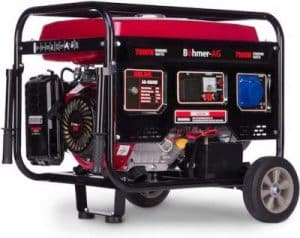
Welder Generator
Should you buy a welder generator?
Let’s find out.
A welder generator is an independent unit that combines a welder with a generator.
In other words, it’s a portable welding machine with a fuel tank.
With a welder generator you can weld on the go using a single device.
With some welder generators, you also have the option to power other appliances.
The idea of a welder generator is interesting, and if you do need to weld outdoors, away from any power outlet, a welder generator might be the right choice.
There are some good quality welding generators on the market. However, when considering buying a welder generator, there are a few things you’ll want to bear in mind:
- You can’t separate the generator from your welder. So it’s a heavyweight to consistently carry around (about 50-60kg on average). If you have access to a nearby power plug, carrying a generator is redundant.
- Devices that combine 2 appliances could incur issues that are more complex to fix. And, if it gets completely ruined you might lose both your welder and generator.
- In comparison to welders, welder generators tend to be more expensive. Buying each device on its own (a welder and a generator), will come to about the same price of a welder generator.
- It can be a bit smelly and messy.
- Some welder generators are fine for welding but aren’t that useful as generators.
If you intend to buy a welder generator, make sure you get a decent unit like this one made by Mosa.
Mosa Welder Generator pros
- Simple to operate.
- Reputable brand name.
- 200amp welder.
- Digital welding control.
- Petrol engine with oil alert.
- Overload protection.
Generator Fuel Types – Gasoline VS Diesel, Which is Better?
Generators can use a few types of fuels. The most common ones are gasoline & diesel.
Here we’ll examine the pros and cons of each of these fuel types.
Gasoline
Pros
-
Easily attainable
-
Increases portability of smaller generators.
-
Typically cheaper than a diesel generator
-
Requires little maintenance
-
Ideal for small jobs
-
Quieter than diesel generator
Cons
-
Less fuel-efficient than diesel
-
Flammable
-
Shorter shelf life
Diesel
Pros
-
Least flammable fuel source
-
Easy to obtain
-
Longer shelf life
-
Tend to be more reliable for Long/heavy duty works
Cons
-
Typically more expensive than a gasoline generator
-
Nosier than diesel generator
Some things to consider when choosing a generator
Manufacturer
Make sure that your generator is from a reliable manufacturer. Being it a brand name doesn’t always mean it’s a good generator. So picking a brand is not essential, but do make research, read reviews, and buy a generator of a decent company.
Electric Start
That an obvious one, but choose a generator that you can easily start with a button, rather than pulling a starter rope.
Noise
There are plenty of reasons why you’d want your generator to be quiet. Ask your supplier and read what other users say about how quiet is the generator you intend to buy.
Operation time & Fuel Tank
Generators with a 20-liter fuel tank can usually run for about 10 hours on a single fill.
A generator that can work for at least 10 hours straight would be a good target to aim for.
That will allow you a full day of work and also ensure you are covered in case of power failures.
Portability
Do your back a favor and buy a generator that is on wheels. Generators are usually pretty heavy and that will allow you to move yours around easily.
Monitoring features
Displays and controls like hours meter, voltage, frequency, and a Low Oil Shutdown, are all advantages when choosing a generator.
An hour meter (that displays how long the engine has run) can also help you with timing your oil change. So bet
Using Multiple devices
If you intended to use the generator for running multiple appliances at the same time (i.e. more than just your welding machine), then the size of the generator you choose should be increased accordingly.
Each device you use with the generator will require more power.
To find out the size of your required generator you’ll need to know
- What appliances you are going to use with the generator.
- How much power each of your appliances requires.
This you can usually find on the specifications label that is located next to the appliance’s power cord. The units would be mentioned in watts, and sometimes, like with welding machines, in amps.
To get an idea of how many watts a welding machine will require from your generator see the table below.
| Welder Amp | Watts Generator | Start-up Wattage |
| 160 Amp | 3600 | 3600 |
| 200 Amp | 4900 | 4900 |
| 250 Amp | 6000 | 6000 |
- The rates given here are only an indication. Always allow room for error. Make a list of your requirements and verify with your supplier if the generator would match them.
Now add up the wattages of all of the devices you are going to simultaneously use with the generator. The number you get is the minimum size of your required generator.
E.g. Appliances you want to use: 160 Amp Welder (3600 watts) + Grinder 600 watts) + TV (200 watts) = 4400 watts generator.
Allow some extra power
Always add a 10-15 percent to the total watts requirement you came up with, to allow an uncertainty factor.
Always Note the Start-Up Power of appliances
Some appliances take extra power to start up. This can be up to four times the running power. There are also devices like a refrigerator that not only requires more start-up power but also are unpredictable of when they start.
So
- Make sure you know the start-up power requirement of each device
- Consider all the appliances that will be connected to the generator and whether some of them are on an on/off cycle.
Safety Tips For Using Generators
- Never try to connect the generator directly to your property’s wiring or circuits. Have a qualified electrician install a transfer switch which you’ll plug the generator into. This will prevent significant safety hazards and help to protect your home wiring from damage.
- Only run the generator outdoors and allow proper ventilation around it.
- Plug appliances directly into the generator
- Use a generator within your appliances’ watts limit and avoid overloading the unit.
- While adding fuel to the generator always make sure – That the generator is off. To avoid spilling fuel on hot parts of the generator. That you don’t smoke or light any flames around the fuel.
- Use proper extension cords from the generator. Low-quality cords can overload and cause risks like fire or damaging your equipment. Also, make sure that the cords are not covered with anything that could make them heat up. And are placed where they don’t cause a tripping hazard.
- Be cautious while handling any of the generator components and electrical cords especially in a wet environment.
- Always have a fire extinguisher near your generator – Make sure that the extinguisher is approved and fully charged at all times.

